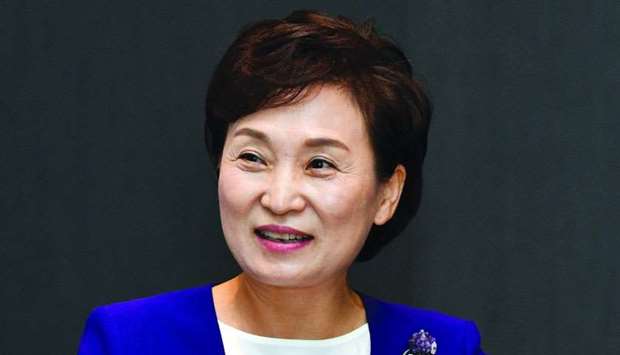Qatar and South Korea are keen to explore new areas of collaboration in smart city and Intelligent Transport System (ITS), aimed at creating more business opportunities for both countries, South Korea’s Land, Infrastructure and Transport Minister Hyunmee Kim has said.
Kim, who was on an official visit to Doha last week, met with Qatar’s Prime Minister and Interior Minister HE Sheikh Abdullah bin Nasser bin Khalifa al-Thani, and Transport and Communications Minister HE Jassim Seif Ahmed al-Sulaiti “to discuss ideas on how to further develop the good working partnership between the two countries.”
“We agreed to expand the horizon of our co-operation in the era of the fourth industrial revolution,” the South Korean minister told Gulf Times on the sidelines of her visit.
She expressed confidence that Korea can contribute in a number of ways to the sustainable transportation and infrastructure development in Qatar.
First is timely provision of infrastructure, Kim said. “With successful projects, Qatar can lower down logistics costs, which will stabilise prices and enhance national competitiveness and reinforce public finance mainly via new energy projects developed with the newly built infrastructure.”
Second, the minister noted that Korea contributes to nurturing of human resources and for six years, it provided an invitational training programme for Qatar government officials in charge of public works.
“The programme shows that Korea’s commitment to Qatar is more than simply building infrastructure,” Kim stressed.
Korea also wants to contribute to Qatar government’s efforts in diversifying its economy away from oil, according to the Minister.
“The Korean government is increasing investment in smart city and ITS to adapt to the changes coming from the fourth industrial revolution,” she said. “I believe the technologies developed can be shared along with relevant experiences and such exchanges will help both countries as they will create new business opportunities and new engines of growth.”
Kim cited the continued interest of Korean construction companies to take part in various infrastructure projects in relation to the 2022 FIFA World Cup.
“My visit this time was short to tour and experience the infrastructure in the country. But I believe that the World Cup in 2022 would give Qatar an opportunity to further improve its infrastructure,” she said.
“From Korea’s own experience, efficient management of infrastructure matters as much as its construction. Korea has experience on infrastructure operation and management so co-operation in this area is also possible,” the minister added.
She noted that the first infrastructure project implemented by a Korean contract was a steel mill project completed in 1976.
Since then, Korean companies participated in 125 projects in Qatar. As of now, there are 20 Korean companies involved in 30 projects.
The minister expressed optimism that joint projects between the two countries will increase in the future.
While a Korean firm is involved in the Doha Metro Red Line Project, in partnership with a Qatari company, Kim disclosed that discussion is underway to form a consortium to bid for the Green Line Extension Project.
“I believe such partnership where a Korean company offers advanced technological solutions to infrastructure projects and a Qatari company brings in its business network in the Middle East benefits both side,” the Minister said.
“For Qatar, it will give opportunities to learn from the construction technologies and know-how of Korea,” Kim pointed out. “For Korean companies, the partnership creates the project of a joint venture in a third country.”
Korea and Qatar developed mutually beneficial partnership
Since the establishment of diplomatic ties in 1974, Korea and Qatar developed mutually beneficial partnership in the energy and infrastructure sectors, according to South Korea’s Land, Infrastructure and Transport Minister Hyunmee Kim.
She said that Korea imports one third of its domestic LNG demand from Qatar and Korean companies built key infrastructure, including oil and gas plants which contributed to the development of the Qatari economy.


